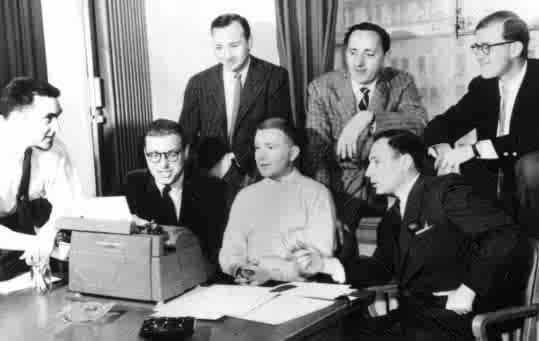Column appears in Sunday's Philadelphia Inquirer
"Caesar was a comedic God." -- Comedian Richard Lewis

Long before Saturday Night Live, before Monty Python's Flying Circus, before Rowan & Martin's Laugh-In, a hulking colossus stalked across the 1950s television stage, creating a frenetic style of comedy that had never been seen before. Last week, at 91, that colossus, Isaac Sidney "Sid" Caesar, moved on to his next venue, leaving behind nearly 70 years of laughter, as well as the foundation for which all television sketch comedy has been based.
Caesar would have struggles while appearing in a multitude of television shows and films, but I'll leave that bio to ET. What I would hope people take from Sid Caesar's life work was his willingness to take the risk that led to something new and hysterically wonderful.
From the late 1940s through the mid-'50s, television programming was in its infancy. No one really knew what they were doing. Notes from television executives had yet to ruin creativity, and talents were placed in front of a camera and left to their own devices.
George Burns and Gracie Allen, Jack Benny, Bob Hope, and Milton Berle ruled the airwaves in much the same style they brought from the vaudeville stage. But with his Your Show of Shows, Caesar drove a truck through the envelope by steering a Mount Rushmore team of comedy writers -- Mel Brooks, Larry Gelbart, Carl Reiner, Neil (and brother Danny) Simon, Mel Tolkin, and others -- through a form of sketch comedy that ignored convention and exploded through the small screen.
No more one-liners, seltzer bottles, and pies in the face. This virtuoso staff of writers fed Caesar situations that mocked everything from the wide world of entertainment to the everydayness of home life. Caesar would then crawl into one of his myriad characters, mangle some foreign language he had no understanding of, and do it all in a flawless dialect. His physicality was so powerful that just watching him would leave one exhausted. An imposing figure with legendary strength and temper, Gelbart had confirmed to me that Caesar once dangled Brooks by the ankles out an 18th-floor window, Now that, ladies and gentlemen, is comedy.
When I worked as a television writer, I helped set up for a Writers Guild evening with Caesar's writers and costars paying tribute to their former boss. These were many of the artists who motivated me and many others in the audience to follow a career path in comedy. I made sure that I sat front row, center seat. As Caesar and his writers shuffled their old and tired bones onto the dais, I felt a twinge of sadness. These were the best. Were the best. If only I had been able to eavesdrop on the genius that flew wildly between these senior citizens when they were at the top of their game. Not tonight, I thought.
Then the stage lights went on and the emcee introduced Caesar. From the moment the applause ceased, and for the next two hours, Caesar and his boys -- Brooks, Gelbart, Simon, Tolkin, Reiner, et al., had the sold-out house doubled-over. Each topped the other, then in turn, beat that. There was no doubt that we were in the midst of infinite greatness. Their humor came across, not dated, but as rich and timely as it was in the '50s. Why? Because it was never about the jokes. It wasn't about the material alone. It was all about the funny. Sid Caesar and the whiz kids behind him knew funny.
Though he was not a stand-up comedian in the strictest sense, Caesar had inspired countless baby boomer comics who grew up in front of the 12-inch screen. The young comedians of my generation, all of whom are no longer anything close to young, filled Twitter and Facebook this week with tributes to Caesar. Perhaps Richard Lewis, a friend of Caesar's, said it best: "His power and command reminded me of Brando's unearthly talent. Caesar was a comedic God."
An award-winning television writer, Steve Young is the author of "Great Failures of the Extremely Successful" (greatfailure.com) that includes interviews with Gelbart and "Ceasar's Hour" co-star, Nanette Fabray.